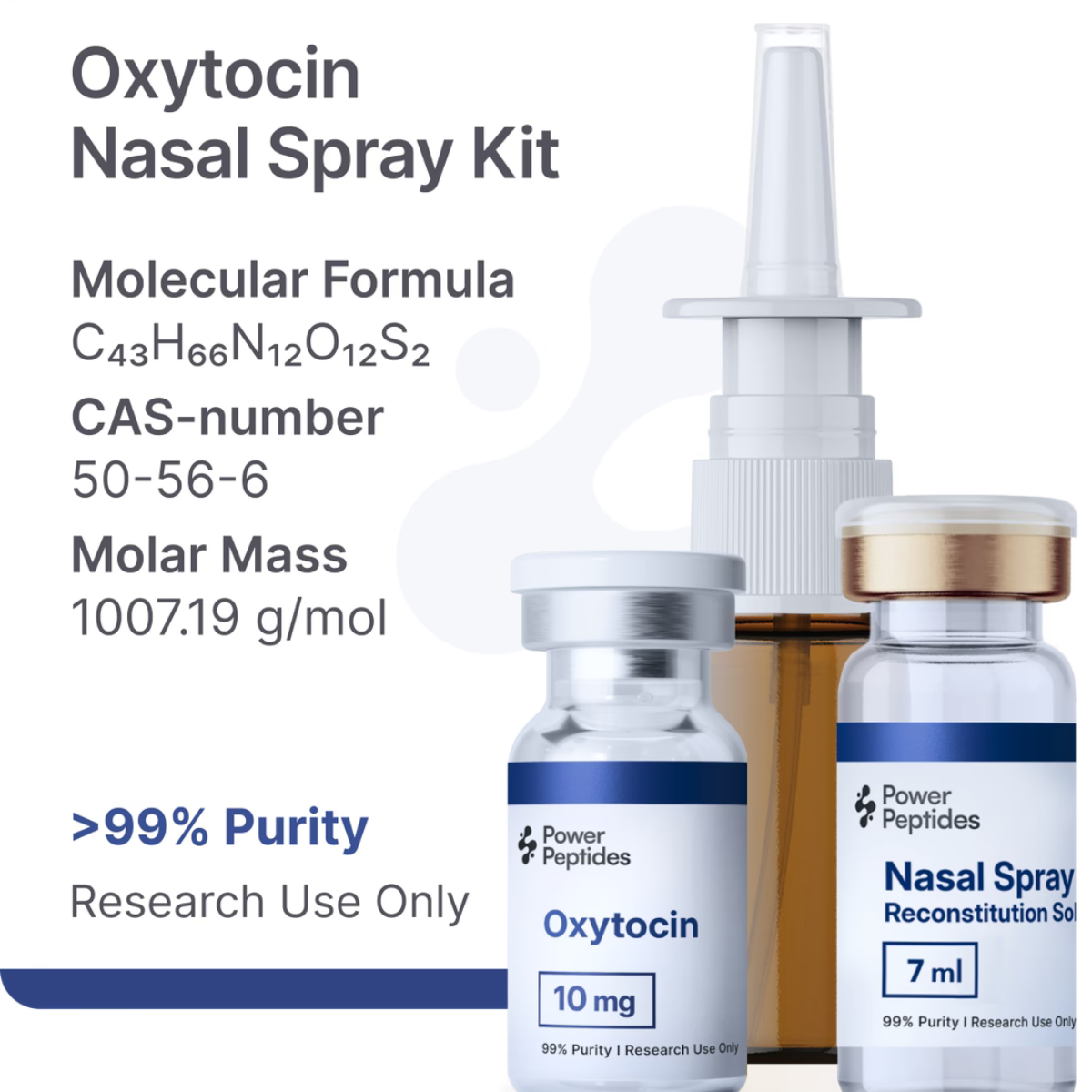Oxytocin Nasal Spray Kit
Oxytocin Nasal Spray Kit
BUNDLE & SAVE
Couldn't load pickup availability
Oxytocin Nasal Spray Kit
Free international delivery within 1-3 business days on orders over $600, with a tracking number provided.
Maximize experimental precision by reconstituting nasal spray peptides only when needed, extending shelf life, and ensuring optimal potency throughout your research timeline. Oxytocin is a nine-amino-acid neuropeptide hormone produced in the hypothalamus and secreted by the posterior pituitary gland. It plays a crucial role in various physiological processes, including social bonding, sexual reproduction, childbirth, and lactation. Oxytocin is also involved in the regulation of stress, anxiety, and pain perception. This peptide has gained significant attention in recent years due to its potential therapeutic applications in various neuropsychiatric and neurodevelopmental disorders.
Characteristics
|
Molecular Formula |
C43H66N12O12S2 |
|
CAS Number |
50-56-6 |
|
Molar Mass |
1007.19 g/mol |
|
Amino Acid Sequence |
Cys-Tyr-Ile-Gln-Asn-Cys-Pro-Leu-Gly |
|
Synonyms |
α-Hypophamine, Oxytocin, Syntocinon |
|
Solubility |
Water-soluble |
|
Organoleptic Profile |
White to off-white powder |
|
Composition |
Lyophilized vial - requires reconstitution |
Specifications
Kit Contents:
- 1 Amber glass nasal spray bottle (10ml capacity)
- Precision nasal applicator with metered dosing (0.12ml per spray)
- Nasal spray reconstitution solution (7ml)
- Oxytocin 10mgLyophilized vial
- Note: Syringes and alcohol wipes required for reconstitution are not included in this kit
How does Oxytocin work?
Oxytocin exerts its effects by binding to specific G protein-coupled receptors, known as oxytocin receptors (OXTRs), which are expressed in various tissues throughout the body, including the brain, uterus, and mammary glands. Upon binding to OXTRs, oxytocin triggers intracellular signaling cascades that lead to diverse physiological responses, such as uterine contractions during labor, milk ejection during lactation, and the promotion of social bonding and trust. In the central nervous system, oxytocin acts as a neuromodulator, influencing the activity of various neurotransmitter systems, such as dopamine, serotonin, and GABA. These interactions are thought to underlie oxytocin's effects on social behavior, stress regulation, and emotional processing. Oxytocin has been shown to enhance the salience of social stimuli, facilitate social recognition and memory, and reduce anxiety and stress responses in mammal models.
Benefits
- Maximize experimental precision by reconstituting nasal spray peptides only when needed, extending shelf life, and ensuring optimal potency throughout your research timeline.
- Research has highlighted the potential therapeutic benefits of oxytocin in various neuropsychiatric and neurodevelopmental disorders characterized by social deficits and emotional dysregulation. For example, intranasal administration of oxytocin has been found to improve social cognition, empathy, and communication skills in individuals with autism spectrum disorder (ASD). Similarly, oxytocin has shown promise in the treatment of social anxiety disorder, enhancing the effectiveness of exposure therapy and reducing amygdala reactivity to fearful faces.
- Oxytocin has also been investigated as a potential treatment for schizophrenia, particularly in addressing negative symptoms such as social withdrawal and anhedonia. Studies have demonstrated that oxytocin administration can improve social cognition, facial emotion recognition, and theory of mind in individuals with schizophrenia. In addition to its effects on social behavior, oxytocin has been shown to have analgesic properties, reducing pain sensitivity and promoting wound healing. This has led to the exploration of oxytocin as a potential therapeutic agent for chronic pain conditions, such as fibromyalgia and migraine.
- Oxytocin's role in stress regulation and anxiety has also been extensively studied. Research suggests that oxytocin may have anxiolytic effects, reducing the activity of the hypothalamic-pituitary-adrenal (HPA) axis and attenuating the stress response. This has implications for the potential use of oxytocin in the treatment of stress-related disorders, such as post-traumatic stress disorder (PTSD) and generalized anxiety disorder (GAD). Furthermore, oxytocin has been implicated in the regulation of appetite and food intake. Studies have shown that oxytocin administration can reduce caloric intake and increase energy expenditure, suggesting its potential as a therapeutic target for obesity and metabolic disorders.
Side Effects
While oxytocin is generally well-tolerated, some potential side effects have been reported, particularly when administered at high doses or for prolonged periods. These may include
- Headache
- Nausea
- Gastrointestinal discomfort
- Dizziness
- Allergic reactions (rare)
It is essential to note that the long-term safety and efficacy of oxytocin administration, particularly for neuropsychiatric indications, require further investigation in large-scale clinical trials.

Why Power Peptides is the best place to buy Epithalon
Power Peptides™ is more than just a trusted U.S. supplier of research peptides. We are a catalyst for scientific advancement, dedicated to providing the highest quality peptides that empower our clients to push the boundaries.
-

Unparalleled Quality
Our proprietary processes and meticulous sourcing of premium materials ensure that every peptide we offer meets the most stringent standards.
-

Independently Verified
Every product undergoes extensive testing, both in-house and through independent, third-party laboratories.
-

Fast Shipping & Support
We provide fast and reliable shipping, using the best couriers and high-quality packaging materials to ensure that your peptides arrive promptly and in optimal condition.
Subscribe to our newsletter
Receive weekly updates with the newest insights, trends, and tools, straight to your email.



